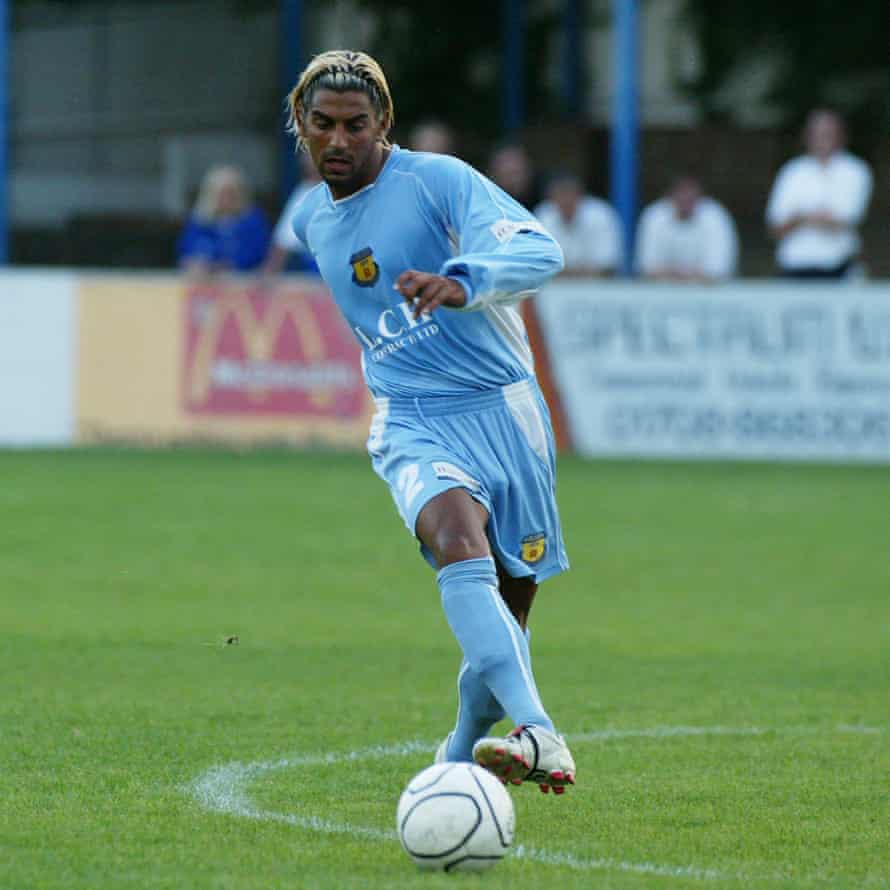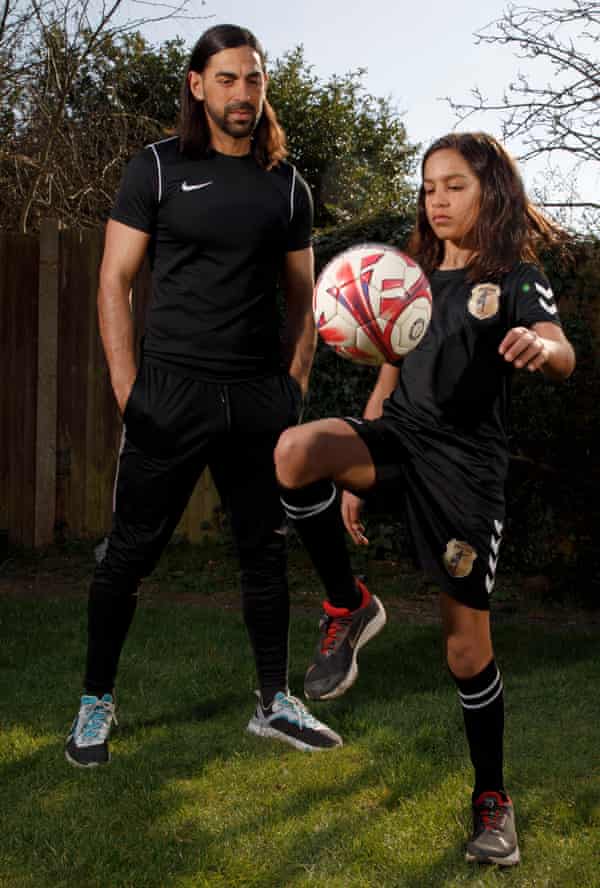Ram Marwa is recounting the time he was racially abused. It occurred during his days as a footballer and, understandably, talking about it is difficult. He is nervous, edgy, upset, but he tells the tale and, having done so, makes a request – that the person involved and the club where it took place are kept anonymous. He is prepared to open old wounds but there is no desire to shame the perpetrator.
The request is accepted and so, ultimately, it boils down to this: one day, when Marwa was a relatively young player and in a changing room minding his own business, a coach said to him: “Shouldn’t your family own a corner shop?”
“I felt belittled,” Marwa says. “I remember him [the coach] looking around for approval after saying what he said and other people who were there laughing. There’s nothing degrading about owning a shop but I felt degraded and now I think about it, it’s crazy a coach could say that to a person of my age and think it was acceptable. But back then things were different and I just had to suck it up and pretended I found it funny.”
It wasn’t funny, but rather the type of thing people from ethnic backgrounds have had to endure for generations, unacceptable comments dressed up as harmless banter, and for Marwa, who is of mixed heritage – the son of a Norwegian mother and a Kenyan-Sikh father, neither of whom has owned a corner shop – it led to lingering frustration regarding what could have been.
He had a decent career, playing for a host of lower-league clubs including Grays Athletic, St Albans, Hayes and Yeading and Ebbsfleet United before retiring at the age of 33. There followed four years as a coach at Arsenal’s Soccer School in Dubai, and now aged 40 and having returned to his native London, Marwa is able to look back at it all with pride.
But looking back also means remembering when he was one of the brightest prospects at Leyton Orient. Marwa joined the club at 14 and was captaining the reserves at 16, as well as being named youth-team player of the year at the end of his first season, and this as part of a generation at Orient that included the future Reading, Aston Villa and England full-back Nicky Shorey. Marwa was a talented central midfielder-come-centre-back for whom big things beckoned but, in the end, he went down the divisions as opposed to up them.
Maybe he simply found his level or maybe something else was at play and for Marwa there is no escaping the feeling that his ethnicity held him back. It’s been that way ever since the corner shop comment. “It had a profound effect on me,” he says. “There’s a lot of subconscious biases around Asian players – he’s too skinny, not strong enough, not got his parents’ support – and after what was said to me I spent my career worried coaches had those biases about me because of my name and skin colour.
“I felt below other players and that I had to work much harder than them in order to succeed. That led to me putting a lot of pressure on myself and not performing at the level I know I could have reached.”

Marwa will never know for sure how much, if at all, his ethnicity played a part in his career but he takes solace from the hope that things will be different for his son, Bjorn, as has embarks on his own football journey. The 13-year-old joined Chelsea’s academy last November and, through that, has been taking part in mentoring sessions organised by the Professional Footballers’ Association as part of its push to increase the historically low number of players of Asian heritage in the sport. PFA figures show there are 15 on pro contracts, with a further nine registered as scholars, across the Premier League and Football League, and this despite people of Asian heritage having long-established roots and making up 7-8% of the population.
There have been numerous attempts over the years to improve representation and the latest is very much a case of turning a negative into a positive – instead of dwelling on the paucity of Asian players, the PFA has decided to use those who are in the sport, as well as some who are retired, as role models by getting them to speak about their experiences to groups of children at academies across the country about their experiences, as well as be on hand to answer any questions they may have. Bjorn has taken part in more than half a dozen such sessions – which take place every Friday, last around an hour and, because of the pandemic, are conducted online – and Marwa is in no doubt about their beneficial and potentially transformative impact.
“It’s great for Bjorn and the other young players to be able to look up to someone from a similar background to them who has made it,” he says. “That was something I never had and which could have made a big difference after I began worrying that my ethnicity would stop me making it: a role model to inspire me and make me think, ‘They’ve made it, so can I.’”

While the mentors, among them the Wales full-back Neil Taylor and Stoke City captain Danny Batth, are free to speak about any incidents of racism they may have suffered in their careers, and answer questions on the topic, there is no particular focus on that issue. That may seem counterintuitive but according to Riz Rehman, the PFA’s player inclusion executive, it is in line with the scheme’s ethos – positivity rather than negativity. “We’ve had discussions about racism during the sessions but, in general, they’re about celebrating Asian footballers and their achievements because nobody ever does that,” he says.
“So we get Neil to talk about playing at the Euros and Danny to talk about winning the Championship [with Wolves] and all the mentors talk about the hidden things they have done to make it as footballers, whether that be training three days a week, making sacrifices to their diet, or dealing with setbacks, like getting injured or being released. It’s about inspiring the next generation while also being realistic with them in terms of what it takes to become a pro.”
As Marwa has discovered, the sessions also involve spreading the message that a career in football does not mean giving up on an education, which in regards to increasing Asian representation specifically, is important. Because while it is a stereotype to suggest all Asian parents are against their children becoming involved in the sport, there is no denying the existence of a cultural mindset that has led to many putting off and even preventing their sons and daughters from doing so, directing them instead towards more academic professions, namely such as medicine and law.
“Many Asian parents simply don’t understand how football works – this mentoring scheme is set up to improve that by providing them with useful and important information, like the fact scholars do A-levels,” says Marwa. “I have years of experience in football and even I didn’t know that; I found it out from speaking with a scholar during one of the sessions. It’s definitely something I want Bjorn to pursue as I believe it’s important for him to be educated.”
That is for the future. For now, Marwa is happy seeing the elder of his sons enjoy being part of Chelsea’s academy, which continues to be the case despite face-to-face coaching sessions suffering the same fate as the mentoring sessions and becoming online-only. Academy matches have also ceased for the time being.
“He plays centre midfield, a little technical player,” Marwa says of Bjorn, who as well as inheriting his father’s love of football has also adopted his long black, shoulder-length hair. “I wanted to play at the top level and Bjorn wants that too. Hopefully he will.”
from Football | The Guardian https://ift.tt/3fp4UF2
via IFTTT

No Comment